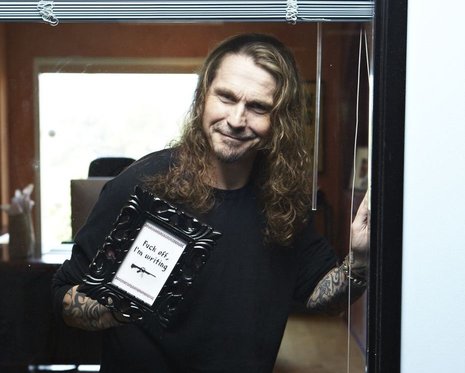Mike Fleming Jr. is Deadline’s film editor. This story appeared in the June 19 issue of AwardsLine.
Sons of Anarchy creator Kurt Sutter has a few things in common with the characters on his show, a gang of tattooed bikers who dwell in the gray areas of society. He also happens to like motorcycles and sports a little ink of his own, though his career is decidedly more above board. Nevertheless, he jokes that he’s on the “outlaw trajectory,” after starting as a writer on FX’s The Shield and moving on to run his own show with SOA. Although SOA has yet to get any Emmy attention, Sutter points out that it’s still connecting with viewers. In fact, the last episode of its fifth season was the most-watched finale in the show’s history.
When I first met you, you were writing movie scripts. What did a cable series like The Shield and now Sons offer you that movies, and all their red tape, did not?
I was first innately drawn into TV with the first TV spec I wrote. I wrote it in, like, a week and a half, and I just instinctually took to the format. I intuitively understood it, even better than I did features. So it was very easy for me to make the transition creatively. And then the benefits are obvious. I know what happens in feature land, and I know what studio notes feel like. I was doing this project at Paramount, and it was an origin story of vampires, where vampirism was a blood disease. So I hooked up with this guy Eli Holzman who had a project—a script from Project Greenlight—and I took that script and applied my theory to it. It was this really cool, dark thing, and then what happens is what happens. We attached our big producer who attached another big director. Then an awful thing happened in which I’m hitting Act 3 of my script, and I’m sitting in my office going, “I have no idea what the fuck I’m writing anymore.” I don’t know why I’m writing it because suddenly it’s like Twilight with guns. The great thing about TV is there’s not time for that. I’m breaking shit on Monday, writing it on Wednesday and shooting it the next Monday. That’s incredibly satisfying creatively and in terms of wanting to see your vision come to life. I’m blessed that I am in the cable world. My tastes and my strong suits—and my lack of people skills—probably live in cable.
Did you see the opportunity with these characters when you started? Did you map it out that far in advance?
I had a sense, and have a sense, of what the big mile markers are, where I ultimately want the direction of my show to go and where I want my characters to land. What I’ve learned after the first couple of seasons—because the first couple of seasons, you’re so scrutinized and you’re wondering if you’re going to be picked up—is that energy fed into the way that I ran the show. And not that they weren’t great seasons, but coming into Season 4, I was more relaxed, the network was more relaxed. Then I was able to loosen the grip on the show, and I think that was a good thing.
You were vocal when Glen Mazzara was the second showrunner on The Walking Dead to be dropped. Is there a kind of brotherhood among this small fraternity of cable showrunners?
You’re in this and experiencing the pressure of it, and the agony and defeat of whether it’s a good season or a bad season, and who gets nominated for awards. Everybody goes through that same angst, so you’re soldiers on the same battlefield. There’s an awareness of the burden of what that is and how important that vision is. When there’s a sense of it being abused or manipulated into something it’s not supposed to be, then I do think people get vocal.
Why does SOA have a hard time getting Emmy recognition?
Maybe I’m just saying this to make myself feel better, but my sense is this: We’re not an art series. We’re perceived as like the big-action, violent series. (Christopher Nolan’s) Batman never gets any Oscar love, because people see it as, “Oh, that’s the summer blockbuster movie. Let’s look as the art stuff. What’s Harvey doing? Those are the things we need to give awards to.” I think there’s that perception globally that that’s what we do, even though my rabid fan base would tar and feather you for limiting it to that. I’m not in any way comparing myself to Nolan, but my sense is that we’re “that show.” The truth is, if our viewership was going down, I might be doubting myself. But critically, we tend to stay in pretty good favor, and obviously our viewership keeps going up each season. So that would suggest that we’re doing something right.
Every time I read something about you, there’s always something incendiary. Is there anyone we want to beat up before I leave?
It’s very funny; it’s sort of the joke now. I do say some very bombastic things, and I do have a strong point of view, but in measured, reserved conversation, it’s not like I’m gunning for anybody. I also really try to be who I am—not that I don’t censor myself or edit myself because clearly I have to, but I don’t let that intimidate me. This is who I am and this is my sense of humor, and lead with that.

